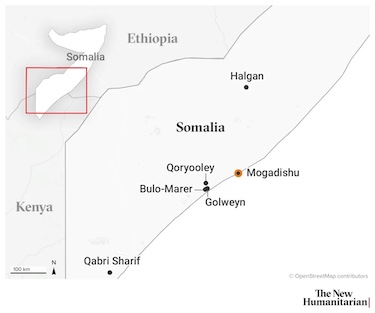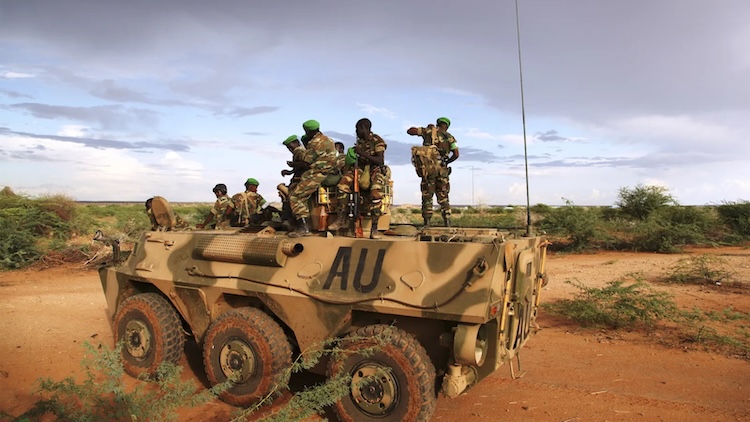By Mohamed Gabobe*
MOGADISHU, Somalia | 14 March 2025 (IDN) — A new African Union peace enforcement mission, known by its acronym AUSSOM, was launched at the beginning of the year to support a fragile Somali government that has struggled against a jihadist insurgency entrenched in the countryside.
AUSSOM is the third iteration of a multinational combat force first deployed in Somalia in 2007. Yet, like its predecessors (AMISOM and ATMIS), it is weighed down by popular misgivings over the human rights record of its soldiers, and the blanket immunity they operate under – which in most cases prevents Somali citizens from winning legal redress for crimes committed.
AU forces are credited with keeping successive Somali governments in power. In gruelling house-to-house urban warfare in 2011, AMISOM managed to push al-Shabab out of the capital, Mogadishu, and took significant losses in the process. It went on to secure most major cities in south-central Somalia, before switching to a less ambitious garrison-based approach.
In 2022, it was re-badged as an 18-000-strong ATMIS mission. Although “degrading” al-Shabab remained a goal, its core rationale was one of transition – building the capacity of Somali’s security forces and local institutions to pave the way for its exit.
AUSSOM is the new acronym for essentially the same mission. However, it operates with fewer soldiers – around 12,000 – uncertain financing, a lack of clarity on troop-contributing nations, and a five-year window to complete the transition. Much of AUSSOM’s benchmarks will also be predicated on the buy-in of the Somali government and a political class over which it has only limited sway.
Public support is crucial to any counterinsurgency operation. But the AU’s near-two-decade-long intervention in Somalia has been mired in controversy. Some of its forces have been accused of abuse – including execution-style killings, rape, and indiscriminate airstrikes. Soldiers have also been involved in criminal rackets, ranging from illicit arm sales to fuel theft.
However, the violations of international humanitarian law (IHL) by AU forces have been on a far smaller scale than abuses committed by al-Shabab, clan militias, or government security forces, according to a report by the Office of the UN High Commissioner for Human Rights.
Nevertheless, the cases of extrajudicial killings, sexual violence, and excessive use of force “have fostered deep-seated resentment among much of the Somali population”, said Jethro Norman, a researcher at the Danish Institute for International Studies. “A perceived lack of accountability has only worsened this distrust – reinforcing the belief that AU troops can act with impunity.”
 Several high-profile cases have shocked the Somali public over the years. They have included the reported beheading of two civilians by Ugandan AU troops last year in the town of Bulo-Marer in the southern Lower Shabelle region, and the execution in 2021 of seven farmers – including a respected community leader – in Golweyn, also in Lower Shabelle, after Ugandan troops had been ambushed on a nearby road.
Several high-profile cases have shocked the Somali public over the years. They have included the reported beheading of two civilians by Ugandan AU troops last year in the town of Bulo-Marer in the southern Lower Shabelle region, and the execution in 2021 of seven farmers – including a respected community leader – in Golweyn, also in Lower Shabelle, after Ugandan troops had been ambushed on a nearby road.
Some of the victims’ bodies in Golweyn were stacked on top of each other and then blown up – violating international codes on the treatment of human remains.
The New Humanitarian has interviewed nearly a dozen people who all alleged that they, or their deceased relatives, were the victims of beatings or killings by AU peacekeepers. In all the cases investigated, none of the soldiers involved were convicted and no compensation was provided to the victims’ families.
Despite repeated emails to AUSSOM, The New Humanitarian did not get a response to the allegations before publication.
Worldwide, civilian deaths during counter-insurgency operations are unconscionably common. Yet security forces tend to escape punishment. From killings by UK troops in Northern Ireland, to NATO air and ground operations in Afghanistan and Iraq, a history of uninvestigated actions has left grieving families without justice or closure.
In Somalia, that impunity has soured relations between AU forces and the Somali public – to the benefit of al-Shabab, which projects a powerful nationalist narrative.
Its record has also complicated the AU’s long-standing goal of securing UN-assessed contributions to finance its peace operations. Earlier negotiations within the world body foundered in part over whether the missions would comply with IHL.
Yet the AU has made progress in developing codes of conduct and tightening disciplinary processes. It has, for example, banned the use of indirect artillery fire – where the target is not in line of sight – and formally adopted a zero tolerance position on sexual exploitation and abuse.
“When it comes to compliance with human rights and IHL, as a result of very terrible experiences, lessons have been learnt and there have been a lot of institutional development,” Solomon Dersso, director of the think-tank Amani Africa, told The New Humanitarian.
That helped pave the way, in December 2023, for Security Council Resolution 2719, which created a framework for the UN to finance 75% of the cost of AU operations – although it’s unlikely a United States objection can be overcome and the mechanism adopted to fund AUSSOM.
Soldiers shielded from prosecution
Dahir Mohamed Ali is a senior human rights lawyer with the Heegan law firm in Mogadishu. He is representing the families of the victims of what has become known as the Qoryooley massacre, in which Ugandan AMISOM troops opened fire on a minibus near the town of Qoryooley in 2016, killing six civilians. The soldiers also torched the vehicle.
The case generated plenty of media attention and attracted the support of the speaker of parliament, MPs, and some government ministers. AMISOM accepted responsibility and said they would pay compensation, according to documents seen by The New Humanitarian. But there have been no prosecutions or financial restitution for the families, said Ali.
At the heart of the problem is the Status of Mission Agreement (SOMA) signed between the Somali government and the AU in 2007, granting blanket immunity to AU forces. Although the SOMA commits AMISOM soldiers to abide by all Geneva Conventions, they are also immune from any legal process in Somalia.
Instead, AMISOM soldiers fall under the “exclusive jurisdiction” of their respective countries regarding “any criminal offences which may be committed by them” in Somalia. UN peacekeepers worldwide are similarly indemnified.
“There have been numerous cases of AU killings that have been taken up with local courts, and taken up by MPs, but there has been no compensation, let alone accountability,” Ali told The New Humanitarian.
Golweyn is an example that even courts with jurisdiction may hesitate to prosecute to the fullest extent of the law. The Ugandan soldiers involved in the killings were eventually court-martialled, with two sentenced to death. But the Ugandan appeals court quashed that verdict – although all the men have been sentenced to long stretches in prison.
While Qoryooley and Golweyn made the headlines, the reality for most victims is a silent suffering – either out of fear of retribution, or because their cases have never come to light.
“Most of the cases of human rights abuses committed by AU forces in Somalia have gone unreported and undocumented,” said Ali. “Most civilian victims don’t have access to the government, or the head of the AU mission [to lodge a complaint]: There is nobody to defend their rights or fight their case.”
“AUSSOM is the same as ATMIS and AMISOM”
Clare Brown is an independent human rights lawyer who has worked in Somalia for over a decade researching and defending victims of human rights abuse. She, along with a number of NGOs, have been collaborating with AU forces to bolster their internal accountability procedures to allow civilians to report incidents of abuse.
The main mechanism is the AU’s Civilian Casualty Tracking, Analysis, and Response Cell (CCTARC), set up to track violations. But it has no independent funds to pay compensation, there is a complicated reporting procedure, and, more fundamentally, it has not been prioritised by the mission, troop-contributing countries, or donors.
Although there have been cases of compensation being paid to the families of those killed by AU troops, “the engagement I have had with CCTARC over the years indicates that it has never really functioned effectively”, said Brown. “There is certainly no transparency, consistency, or predictability to these payments.”
Dersso, who led an assessment mission to Somalia in 2018 on the AU’s compliance with IHL and human rights, is less dismissive of CCTARC. “Certainly it has its limitations, but that doesn’t mean it’s functionally useless,” he noted.
But domestic perceptions are paramount. Most Somalis fail to differentiate between the AU’s three separate missions, seeing them all as unaccountable foreign interventions, which many believe are merely a tool of Western interestsdesigned to keep Somalia dependent.
“AUSSOM is the same as ATMIS and AMISOM. A new name, but the same force,” said Abdullahi Salah*, who alleged his vehicle was shot up, and he and three other men were detained and beaten by AU soldiers in 2023. “This is why I won’t pursue any justice – there is nothing that can be done when they do bad things to you.”
But the more essential problem, said Dersso, is why there is an intervention in the first place – and what that says about the more than three decades of state failure in Somalia.
“The fundamentals of what’s broken at the domestic political level need to be fixed,” he noted. “You can’t continue lurching from one mission to another. Somalis need to have a national political settlement, otherwise we will have this perpetual insecurity.”
* A pseudonym was requested out of fear of possible reprisal.
With additional reporting by Obi Anyadike.
Original link: https://www.thenewhumanitarian.org/analysis/2025/03/12/african-union-peacekeepers-somalia-accused-widespread-abuse
*Mohamed Gabobe is a Freelance Journalist based in Mogadishu, Somalia. [IDN-InDepthNews]
Image: African Union forces have been deployed in Somalia for almost two decades backing successive governments against the insurgent group al-Shabab. AU UN IST Photo/Mahamud Hassan


